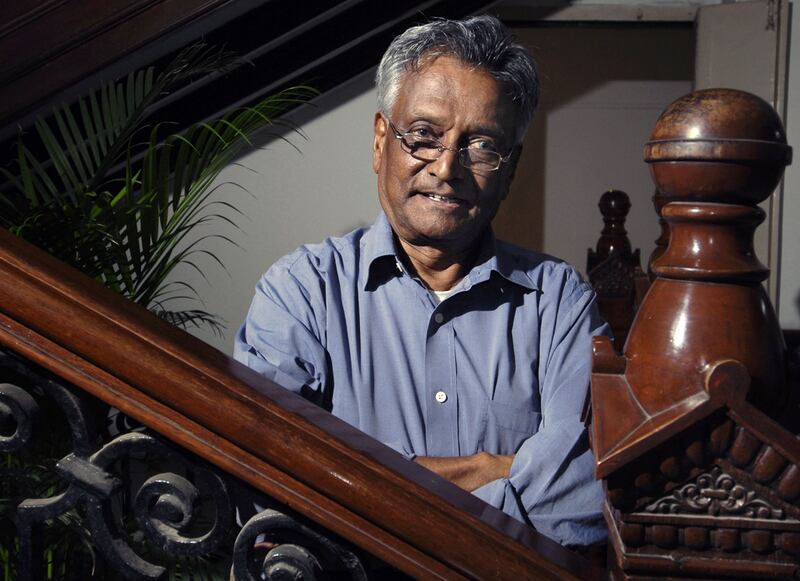NEW DELHI // SV Raju, the last surviving leader of India’s only economically liberal party, died on Tuesday at the age of 81, having failed to convince his country to stop describing itself as officially “socialist”.
Raju was once the executive secretary of the Swatantra (or “Freedom”) Party, which was founded in 1959 and briefly became India’s largest opposition party before dissolving in 1974.
Raju, a close associate of Swatantra’s founder, the freedom fighter C Rajagopalachari, kept up a raft of campaigns against socialism even after the party broke up.
Most notably, in 1994, he petitioned the Bombay High Court to strike down a 1989 amendment to the Indian constitution, which stated that only groups declaring themselves to be socialist could be registered as political parties.
In an example of the infamous delays arising in the Indian judiciary, the court admitted Raju’s petition, but more than 20 years later, the case has yet to be heard.
Meanwhile, Raju’s co-litigant, LR Sampat, has since passed away.
"I sometimes joke that the courts are now waiting for me to go," Raju said tongue-in-cheek to Mint, a financial daily, in 2007.
Other moves to roll back India’s official commitment to socialism – enshrined in the constitution’s preamble, to which the word “socialist” was added in 1976 – have also failed.
In 2007, the Good Governance India Foundation (GGIF), a Kolkata-based think tank, petitioned the Supreme Court that the constitution’s preamble should not describe India as a socialist republic.
The word socialist, the petition said, “is wholly inconsistent with a Constitution that encourages free thought, expression and belief”.
But the Supreme Court, in a short order, held “that the question, though important, is academic”. It dismissed the petition.
Sanjiv Kumar Agarwal, a GGIF trustee and the main petitioner in the 2007 suit, told The National that the judiciary's refusal to entertain his or Raju's plea left India appearing "slightly hypocritical".
“If you see the present government, it is anything but socialist,” Mr Agarwal said, pointing out that market reforms over the last two decades had moved India further from socialism.
“And yet our constitution describes India as socialist.”
“It is in the nature of things globally to move away from socialism, because it is unworkable,” he said. “India is no exception. It’s just that it is happening at our particular speed and style, which is elephantine.”
Mr Agarwal hailed Raju and the Swatantra Party as pioneers. “They created the space for this debate to happen,” he said.
The Swatantra Party was established in ideological opposition to Jawaharlal Nehru’s Congress party, which dominated India’s independence struggle and post-independence politics. Nehru believed firmly in a socialist state, a view to which Rajagopalachari – and Raju – did not subscribe.
In its 21 founding principles laid down in 1959, the Swatantra Party committed itself to “social justice and equality of opportunity”, but it also championed free enterprise – “maximum freedom for the individual and minimum interference by the state”.
Although Nehru attacked the party as belonging to “the Middle Ages of lords, castles and zamindars [large landowners]”, it achieved notable electoral success.
In the 1962 general election, it won 6.8 per cent of the total votes. And in the 1967 election, by winning 8.7 per cent of the votes, it became the largest party in opposition to the Congress when it took 44 seats in the Indian parliament’s lower house.
But Nehru’s daughter, Indira Gandhi, aggressively promoted socialism in the 1971 election, promising to use it to eliminate poverty – a seductive promise in a largely poor country like India.
The Swatantra Party won just 3 per cent of the vote, and it was soon beset by infighting.
Rajagopalachari was already ill by then, Raju revealed in an interview to Open magazine last year. The two men met six months before Rajagopalachari – or Rajaji, as he was fondly known – passed away. “Rajaji said, ‘I want you to keep the old leaders together because I am afraid that they are all wanting to go away’,” Mr Raju said in the interview.
The prediction proved correct.
Without Rajagopalachari at the centre, the party crumbled, its various members joining other parties or leaving politics altogether.
Raju subsequently started and assisted a range of liberal groups and publications, but nothing ever achieved the momentum that the Swatantra Party once enjoyed.
He often said that he still wanted to revive Swatantra and its ideals.
“I am too old to take this up,” he said last year, “but I’ll try and see if I can put the party back on its feet.”
ssubramanian@thenational.ae





